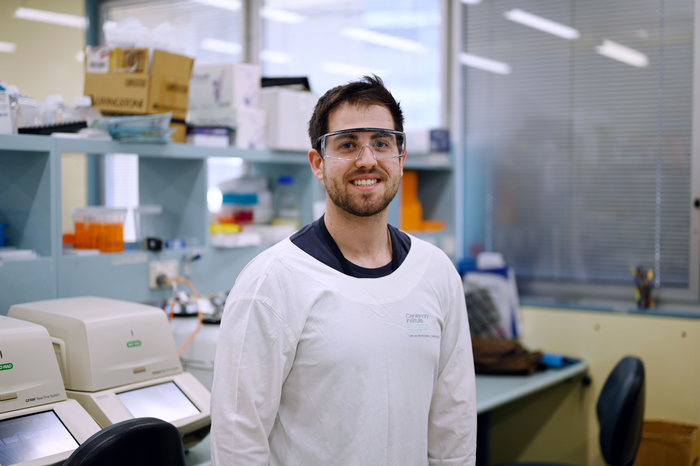Researchers from the Centenary Institute and the University of Technology Sydney have published the first study showing why people with chronic obstructive pulmonary disease (COPD) are at higher risk of developing severe COVID-19.

Credit: Centenary Institute
Researchers from the Centenary Institute and the University of Technology Sydney have published the first study showing why people with chronic obstructive pulmonary disease (COPD) are at higher risk of developing severe COVID-19.
The findings, reported in the American Journal of Respiratory and Critical Care Medicine, could lead to the development of new therapeutic interventions that reduce COVID-19 infection in COPD patients.
An inflammatory lung condition, COPD causes airway blockage and makes it difficult to breathe. It affects around 400 million people globally. The increased susceptibility to COVID-19 of COPD patients is still to be fully understood.
In the study, the researchers infected differentiated airway cells from COPD patients and healthy people with SARS-CoV-2 (the virus that causes COVID-19).
The researchers found that the COPD airway cells had 24-fold greater infection with SARS-CoV-2 than the healthy cells.
“We examined the genetic information of infected cells through advanced single cell RNA-sequencing analysis,” said lead author of the study, Dr Matt Johansen, from the Centenary UTS Centre for Inflammation.
“Seven days after SARS-CoV-2 infection, there was a 24-fold increase of viral load in the COPD patient airway cells compared to the cells taken from healthy individuals.”
Significantly, the team found that the infected COPD cells had increased levels of transmembrane protease serine 2 (TMPRSS2) and cathepsin B (CTSB). Both are enzymes that SARS-CoV-2 uses to enter into the host cell.
“These two enzymes are increased in COPD patients and favour greater SARS-CoV-2 infection compared to healthy people. Simply put, easier and increased cell infection makes it far more likely that individuals with COPD will have more severe disease outcomes,” said Dr Johansen.
Other results from the study showed additional reasons for COPD patient susceptibility to severe COVID-19.
Key anti-viral proteins (interferons) that protect against infection were largely blunted in the COPD patient airway cells. This was a likely trigger in causing increased viral production in COPD patients.
Dr Johansen said that infected COPD patient airway cells also had higher levels of pro-inflammatory cytokines, which are linked to more severe COVID-19 and COPD outcomes.
“COPD is an inflammatory disease with patients having increased inflammation at baseline compared to healthy people. It’s highly likely that SARS-CoV-2 exacerbates this existing high inflammation level which leads to even poorer outcomes,” he said.
Initial laboratory drug testing by the researchers, to inhibit the enzymes TMPRSS2 and CTSB, and to target the high inflammation levels, successfully and substantially reduced SARS-CoV-2 viral levels in COPD patient cells, ultimately confirming the study’s results.
“Collectively, these findings have allowed us to understand the mechanisms of increased COVID-19 susceptibility in COPD patients,” said Professor Phil Hansbro, the study’s senior author and Director of the Centenary UTS Centre for Inflammation.
“We believe that new drug treatments targeting relevant enzymes and pro-inflammatory responses in SARS-CoV-2 infection could have excellent therapeutic potential in reducing the severity of COVID-19 in patients with COPD.”
Professor Hansbro said the research was critical with hundreds of millions of people affected by COPD globally and with COVID-19 likely to be around for many years to come.
[ENDS]
Publication:
Increased SARS-CoV-2 Infection, Protease and Inflammatory Responses in COPD Primary Bronchial Epithelial Cells Defined with Single Cell RNA-Sequencing.
https://www.atsjournals.org/doi/10.1164/rccm.202108-1901OC
Images:
Dr Matt Johansen: https://drive.google.com/file/d/1Wc5WxHcS1fSWE68Q7xu8jT53Dki2ZBo4/
Professor Phil Hansbro:
https://drive.google.com/file/d/1GaHOyCjXfSb3hsE_bS-g2Cxs81dEhL4G/
For all media and interview enquiries, please contact
Tony Crawshaw, Media and Communications Manager, Centenary Institute on 0402 770 403 or email: [email protected]
About the Centenary Institute
The Centenary Institute is a world-leading independent medical research institute, closely affiliated to the University of Sydney and the Royal Prince Alfred Hospital. Our research focuses on three key areas: cancer, inflammation and cardiovascular disease. Our strength lies in uncovering disease mechanisms and applying this knowledge to improve diagnostics and treatments for patients.
For more information about the Centenary Institute, visit centenary.org.au
About the University of Technology Sydney (UTS)
The University of Technology Sydney (UTS), located in central Sydney, is one of
Australia’s leading universities of technology. It is known for fusing innovation, creativity
and technology in its teaching and research and for being an industry-focused university.
For more information go to uts.edu.au
Journal
American Journal of Respiratory and Critical Care Medicine
DOI
10.1164/rccm.202108-1901OC
Method of Research
Experimental study
Subject of Research
Cells
Article Title
Increased SARS-CoV-2 infection, protease and inflammatory responses in COPD primary bronchial epithelial cells defined with single cell RNA-sequencing
Article Publication Date
12-May-2022




